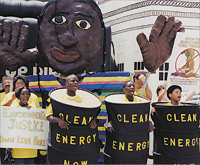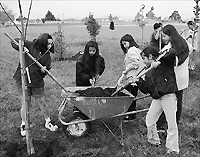|
by Bruce Hamilton, Director of Conservation
Tragedy of Sept. 11 changes tone, but not substance of environmental campaigns
 Following Sept. 11, pundits and politicians told us the tragic events had "changed the world." Certainly the world is different for many of us -- particularly the families and friends who lost loved ones in the attacks, the soldiers and civilians in Afghanistan and the postal workers who sort the mail. Indeed, Americans' sense of domestic security has been shaken to the core. Following Sept. 11, pundits and politicians told us the tragic events had "changed the world." Certainly the world is different for many of us -- particularly the families and friends who lost loved ones in the attacks, the soldiers and civilians in Afghanistan and the postal workers who sort the mail. Indeed, Americans' sense of domestic security has been shaken to the core.
But what hasn't changed are the values Americans place in clean water, clean air and wild forests. For many, the connections with special places in nature may be stronger. What also may have changed is our willingness to look beyond our own needs and embrace collective action to better the world we live in.
But the environmental debate in the U.S. Congress, after a brief hiatus, appears to be pretty much the same as it was before Sept. 11. The rhetoric on both sides has been tempered, but the basic positions and problems appear to have changed very little.
The war with Afghanistan has certainly placed national energy policy -- specifically our dependence on oil -- front and center politically. While the short-term supply-and-demand problems in California have abated and the price of oil has dropped dramatically, there is still a sense of urgency that we must correct our course soon to achieve energy security.
To the energy industry and its allies in Congress and the White House, the solution is clear: ramp up domestic production of oil, coal and nuclear power -- and subsidize it to the tune of $30 billion. At the top of their wish list is oil development in the Arctic National Wildlife Refuge.
Numerous legislators, such as Sens. Murkowski (R-Alaska) and Inhofe (R-Okla.), have tried to attach their wish list to various bills, from airline security to economic recovery to railroad workers' retirement, claiming that America needs more domestic production to combat terrorism.
The Club has worked to discount this short-sighted approach. If we're worried about the vulnerability of our oil supply to terrorist attack, why would we want to make our country even more dependent on an 800-mile long pipeline from the Arctic Coast that was recently disabled by a drunk with his hunting rifle?
 But we haven't only been on the defensive. Around the country, Club staff, members and volunteers have been working to educate the public about cleaner, cheaper and safer sources of energy. By reducing our dependence on oil -- foreign and domestic -- and investing in energy efficiency and small-scale clean, renewable energy resources, we can achieve true energy security. Raising automobile fuel efficiency, adopting tougher efficiency standards for major household appliances, retrofitting homes and businesses with energy conservation measures and installing windmills and solar collectors can lead to a secure energy future that terrorists can't disrupt. These measures also have the added benefit of curbing, rather than contributing to, global warming. But we haven't only been on the defensive. Around the country, Club staff, members and volunteers have been working to educate the public about cleaner, cheaper and safer sources of energy. By reducing our dependence on oil -- foreign and domestic -- and investing in energy efficiency and small-scale clean, renewable energy resources, we can achieve true energy security. Raising automobile fuel efficiency, adopting tougher efficiency standards for major household appliances, retrofitting homes and businesses with energy conservation measures and installing windmills and solar collectors can lead to a secure energy future that terrorists can't disrupt. These measures also have the added benefit of curbing, rather than contributing to, global warming.
Global warming, arguably the biggest threat to global environmental security, remains unaddressed by the world's superpower. Despite the Bush administration's new role as leader of a global coalition against terrorism, it is still refusing to take action against global warming. At the most recent international meeting in Morocco to discuss implementation of the Kyoto Protocol, the United States -- the world's main contributor to global warming -- was a no-show.
Before Sept. 11, polling showed that the Bush administration's environmental policies were out of step with the values held by the vast majority of the American people, and that Bush's performance on the environment was the area in which he was least trusted. As Bush's popularity soared after the attack, the administration gave environmentalists some cause for hope when it reversed itself and allowed a Clinton administration proposal limiting arsenic in drinking water to go into effect.
But that was an anomaly, not a trend. In short order, the administration renewed its moves to allow roadbuilding and logging in wild forests set aside for protection by the Clinton administration, ease environmental safeguards for mining on public lands, reverse a phaseout of snowmobiles in Yellowstone National Park, make it easier for developers to destroy wetlands and bar the reintroduction of grizzly bears in the Northwest. But the most blatant anti-environmental move was the renewed effort to open the Arctic Refuge to oil development. Interior Secretary Gale Norton was so eager to build her case that she was caught misrepresenting data to Congress, claiming that her agency's biologists said that the coastal plain of the refuge was not critical for the survival of the caribou, when just the opposite was true. When challenged, she admitted she made an error.
The past year has mostly been characterized by a series of standoffs. The administration and developers tried to reduce the size of the new national monuments, but at public hearings and in the courts they were told the monuments were popular and legal. The administration also tried to undermine the wild forest initiative, which protected 60 million acres of roadless areas in the national forests, but when it ordered another round of public comment hoping to gin up more support for logging and mining, it found that public support for full protection was stronger than ever.
And there was good news. In the first week of December, the Club won spectacular victories in New York and Florida: the Environmental Protection Agency confirmed its ruling that General Electric must pay to clean up PCBs in the Hudson River and Miami-Dade County gave up its bid to build a commercial airport adjacent to the Everglades.
But on the day in between these wins, the U.S. House of Representatives voted to give the president power to negotiate new trade agreements without adequate environmental safeguards and to force Congress to accept or reject them without the possibility of amendments.
The Sierra Club continued through the year to play a major role in stopping most of these anti-environmental initiatives. But by far the biggest role was played by the American people, who let the administration and the polluters know that what did not change on Sept. 11 is our love of nature.
As our country, and the world, grapple with combatting terrorism and man's inhumanity to man, we need to redouble our efforts to protect the natural heritage in which we can take refuge. As Henry David Thoreau told us, "In wildness is the preservation of the world." And in working to protect wildness, we may be preserving our souls, and our nation.
Photo (top) courtesy Darryl Malek-Wiley, caption: Wildlands and the People Who Protect Them: In 2001, Sierra Club members, staff and volunteers put their creativity to use as they worked to protect wildlands. Barrel-clad Baton Rouge residents belt out their opposition to a relaxation of clean air rules.
Photo (bottom) courtesy Robin Way. Fifth graders in Casear Chavez Elementary School in Salinas, Calif., dig in with their shovels to put the final touches on a newly planted tree.
Up to Top
|